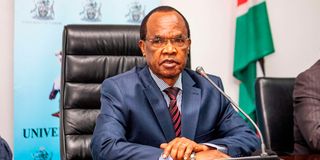University council bosses vow to end mismanagement, disputes

Prof Amukowa Anangwe.
For close to a decade, most of the 43 public universities in Kenya have been struggling to stay afloat, thanks to governance and financial challenges, including debts cumulatively amounting to Sh70 billion.
While vice-chancellors blamed the differentiated unit cost model for the financial woes, the government accused university councils of mismanagement.
Chairpersons of university councils have had frosty relations with VCs, causing friction in management.
Recently, university council chairpersons met to discuss and plan rescuing the institutions from collapse.
Their chairperson, Dr Christopher Gatama of Machakos University, admitted that mismanagement arises from inadequate governance, adding that chairpersons at times fail to take up their responsibilities and allow the VCs to have more latitude than is necessary.
“Perhaps some of you do not know what I mean. VCs are employees of the university councils. Following the right governance principles, the law and other instruments used in the management of public universities will not result in these endless conflicts,” Dr Gatama said.
He added that disputes arise when the councils and VCs fail to stay in their official space.
“It has happened in some institutions. It should, however, be noted that the relation between the councils and VCs in most universities is cordial,” Dr Gatama said.
“The biggest issue we need to address is how to support VCs with resources in the hope of reducing the challenges.”
Dr Gatama urged the council chairpersons to take their responsibilities and commitment to delivering on their mandate seriously.
Resource availability
He added that the general challenges public universities face are related to governance, resource availability, space and visibility.
The council chairpersons said at a retreat in Mombasa that universities must have strategies to generate income, including working with corporates, manufacturers and sourcing for funding from international donors, including green and climate financing.
They said the universities need to establish partnerships with others in Kenya and abroad.
“We recognise the resources coming from the government are limited. The truth is that the gap will keep growing over time. That means we won’t be making any meaningful progress if there is no finance or other resources,” Dr Gatama added.
In a communiqué, the university council bosses agreed on 10 points, including strengthening strategic governance; enhancing coordination and collaboration with the government and regulators; promoting visibility, credibility and leadership integrity; re-aligning with national and international priorities; embracing innovation and digital transformation and financial sustainability.
Other strategies are advancing graduate education, research and commercialisation; and building strategic partnerships and international linkages.
“Post-graduate programmes need to be repositioned as drivers of research and commercialisation using holistic business scholarship models,” the communiqué said.
“Councils will promote university-to-university and quality international collaborations, including East African Community (EAC) harmonisation and global recognition of Kenyan graduates.”
They pledged to champion a culture of innovation, with public university councils leading in accountability and nurturing ethical and strategic leadership.
The council chairpersons reaffirmed their role in managing the public universities through ethics and policy direction.
A new governance structure will also be redefined, they said.
“We will pursue legal reforms and leadership succession will be prioritised since the current structures are not delivering,” the communiqué said.
The council bosses added that a formal engagement protocol would be developed to strengthen consultations with the Ministry of Education and regulators.
“A collaboration blueprint will guide coherent implementation of education policies. A National Monitoring and Evaluation Framework and a Governance Performance scorecard will be introduced to improve institutional oversight, performance and ethical compliance,” they added.
The chairpersons said they are committed to working with the government, regulatory organisations, development partners and institutional stakeholders to implement the resolutions made at the meeting.
Cases of ineptitude
“These outcomes are intended to reposition public universities as globally competitive, socially responsive and financially sustainable institutions driving the development agenda of the country,” they said.
Dr Gatama added that the universities would also strive to reduce the high cost of management by adopting Artificial Intelligence and other technology.
“Students can learn wherever they are. One doesn’t have to be in the lecture room. With technology, the lecturer can be accessible anywhere,” Dr Gatama said.
On if the new funding model is working, Dr Gatama said implementation faces challenges because the kitty has remained the same.
He added that there is need for universities to look for more funds.
“What prompted the new funding model was the inadequate resources for universities, but we should recognise that the model did not increase resources, the funds and the money from parents or the government,” he said.
The retreat was called to reflect on the state and future direction of public university governance, financial sustainability, academic relevance and innovation.
“This was a successful meeting. It handled issues to do with the governance, which recognises contemporary challenges as evidenced by some of our institutions,” Dr Gatama said.
Education Cabinet Secretary Julius Ogamba said universities are experiencing financial difficulties due to bloated workforces.
Cases of ineptitude
He admitted that universities are grappling with complex issues, including financial instability, governance challenges, low competitiveness and diminishing public trust.
“Make hard decisions, including stopping hiring, adhering to integrity and procurement and not misusing resources. Don’t allow yourselves to be blackmailed,” the CS said.
Mr Ogamba added that some university councils have become a let-down.
“We have witnessed appalling cases of ineptitude. Many of these are a direct result of financial mismanagement, administrative disorder and human resource decay,” he said.
He cited court cases of human resource malpractices, over-employment and in some situations, ethnic discrimination linked to questionable decision-making by public university councils.
The minister praised the higher education financing model, saying it has enabled thousands of students from vulnerable and low-income backgrounds to join university.
He told education stakeholders that the ministry is in the process of enhancing the model by addressing teething challenges, refining the eligibility criteria and ensuring that every deserving Kenyan has a chance to pursue post-secondary school training.


